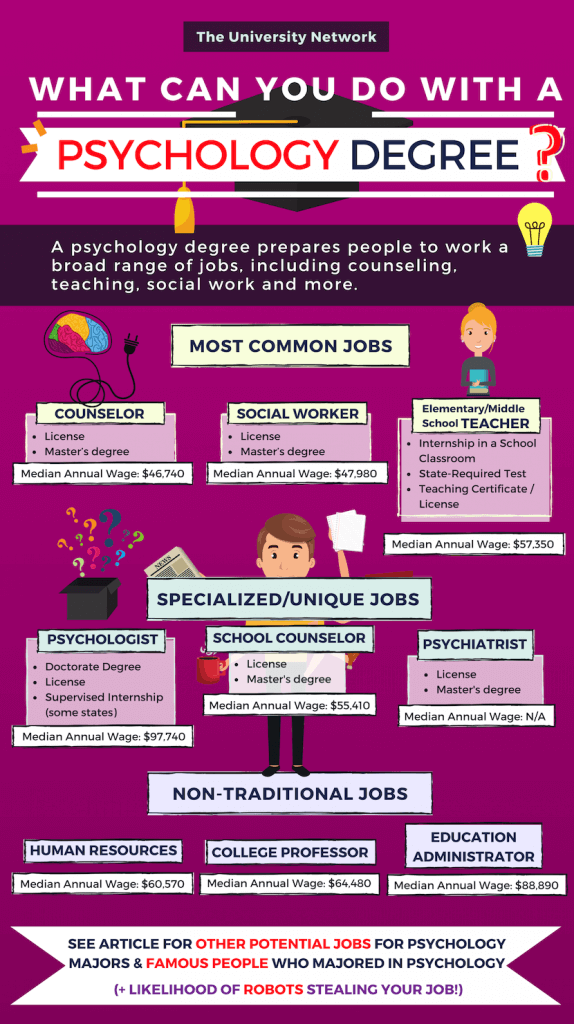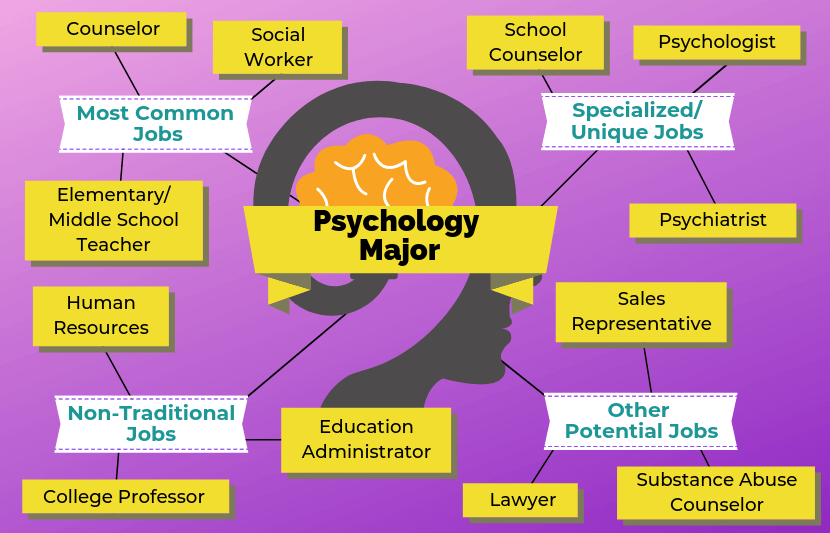Psychology Jobs

People who study psychology are trained to analyze and predict people’s mental behavior, so they can help them overcome the challenges they’re facing at home, in school, and in personal and professional relationships. A psychology degree prepares people to work a broad range of jobs, including counseling, teaching, social work and more.
Here is a list of 12 possible jobs for a psychology major:
Most Common Jobs For Psychology Majors
1. Counselor

Counselors share many responsibilities with psychologists, as they are both responsible with helping people overcome mental ailments. However, counselors typically are asked to provide more general therapy, while psychologists usually help people with more specific, intense mental illnesses. Counselors work in hospitals, schools, correctional facilities, and retirement homes, among others. Rules vary from state to state, but generally, a license and master’s are required to start practicing.
Median annual wage: $46,740
Common entry-level degree: Master’s degree & license
Likelihood that robots will take your job: 0%
2. Social Worker

Similar to counselors, social workers are responsible for helping people who may have mental disorders work through their ailments. But social workers may be less likely to offer immediate help or crisis management. Instead, they may point people in the direction to gain the help and support they need. Social workers work at hospitals, schools, military bases, prisons and more. All social workers are required to be licensed, and most of the time, a master’s in social work is also needed to earn a job.
Median annual wage: $47,980
Common entry-level degree: Master’s degree & license
Likelihood that robots will take your job: 0%
3. Elementary/Middle School Teacher

After earning an undergraduate degree, those who aspire to teach in elementary or middle schools have to complete an internship in a school classroom, pass the state-required test for teachers and receive a teaching certificate/license.
If you are dead set on being a teacher, the best advice would be to major in education. But if you’re still uncertain about what you want to do, a psychology major could ultimately help you land a teaching job.
Median annual wage: $57,350
Common entry-level degree: Undergraduate degree & teaching certificate
Likelihood that robots will take your job: 0%

Specialized, Unique Jobs for Psychology Majors
4. Psychologist

Psychologists are masters of the human mind. They help individual people overcome deep mental ailments and disorders through, primarily, conversation. Before one can become a practicing psychologist, one must complete a doctorate degree and earn a license. Some states require a supervised psychology internship, which could last a couple of years.
Median annual wage: $97,740
Common entry-level degree: Doctorate degree & license
Likelihood that robots will take your job: 0%
5. School Counselor

School counselors can have a wide range of requirements, depending on the school. But generally, they help students overcome personal and emotional problems, help students set and achieve academic and personal goals, and sometimes even help students with the college application process. Like most jobs on this page, school counselors must earn a master’s and a state license.
Median annual wage: $55,410
Common entry-level degree: Master’s degree & license
Likelihood that robots will take your job: 0%
6. Psychiatrist

Psychiatrists are certified doctors with the ability to prescribe patients medicine for their behavioral health problems, addictions, mood disorders and more. To become a psychiatrist, you have to earn a medical degree and complete a residency before you can apply for a state license. Typically those who aspire to become psychiatrists earn their undergraduate degrees in psychology or a field associated with pre-med, including biology, neuroscience, physics and more.
Median annual wage: N/A
Common entry-level degree: Medical degree & license
Likelihood that robots will take your job: N/A
Non-Traditional Jobs for a Psychology Major
7. Human Resources

Human resources (HR) positions are very common in a wide range of industries. Essentially, they are responsible for all employee relations. HR personnel typically are the people who do the hiring, firing and mitigating within a company. Good HR employees are impartial, empathetic and not afraid of confrontation. Because psychology students are trained to analyze people’s mental behavior, they often make good candidates for HR jobs.
Median annual wage: $60,570
Common entry-level degree: Bachelor’s degree
Likelihood that robots will take your job: 31%
8. College Professor

Communication, patience, organization and enthusiasm are some of the most important characteristics of a good college professor. To earn a job teaching at the post-secondary level, a master’s (and sometimes a doctorate degree) is required. In addition to teaching, some college professors also are assigned to conduct research and write scholarly articles.
Median annual wage: $64,480
Common entry-level degree: Master’s
Likelihood that robots will take your job: 3%
9. Education Administrator

Education administrators generally work in educational environments, but not as teachers. Broadly, they are the people in charge of overseeing administrative tasks within a school. They could be principals, but job titles may vary. You don’t need a specific undergraduate degree to become an education administrator, but those who study psychology develop critical thinking and empathy skills that translate well to the job.
Aspiring education administrators must go on to earn their teaching license, work for a few years as a teacher, complete a master’s in education administration and, typically, pass a state test to receive a administrator’s license.
Median annual wage: $88,890
Common entry-level degree: Master’s & administrator’s license
Likelihood that robots will take your job: 0%
Other Potential Jobs for a Psychology Major
10. Substance Abuse Counselor

Substance abuse counselors help those who are struggling with drugs or alcohol overcome their addictions. They could work with individuals or full groups. Similar to other counseling jobs on this list, a license and a master’s in counseling are often required to earn a job as a substance abuse counselor.
Median annual wage: $43,300
Common entry-level degree: Master’s & administrator’s license
Likelihood that robots will take your job: 3%
11. Lawyer

Presumably due to their interest in analyzing the human mind, some psychology students go on to be lawyers. But, to do so, completing an undergraduate degree program is just the first step. If you want to become a lawyer, you will also have to pass the Law School Admissions Test (LSAT), apply to law school, earn a Juris Doctor degree and pass the Bar examination — all before you can begin to practice law. Generally, it takes 3 years to graduate from law school, so the entire process takes 7-8 years.
Common entry-level degree: Juris Doctor degree
Likelihood that robots will take your job: 4%
12. Sales Representative

Although it is unusual for aspiring sales representatives to study psychology in college, the two fields call for similar skills, including the ability to read people and gauge what is going on in their mind. Requirements vary from company to company, but good sales people should be able to speak comfortably with anyone at any time. Because sales jobs often involve cold calls, good sales people should also be able to quickly bounce back from rejection.
Median annual wage: $52,460 (varies heavily)
Common entry-level degree: High School diploma/undergraduate degree
Likelihood that robots will take your job: 85%
Analysis of Labor Statistics and Demand for Doctoral-Level Psychologists
Introduction
The need for highly trained psychologists is more critical than ever, given the increasing prevalence of mental health issues and the complexity of developmental disabilities. This analysis examines the rising demand for doctoral-level psychologists—specifically clinical and counseling psychologists, forensic psychologists, and industrial organizational psychologists—and discusses the implications for students pursuing a doctoral degree in school psychology.
Key Statistics for Current Labor Market Trends
According to the U.S. Bureau of Labor Statistics (BLS), the job outlook for psychologists, particularly clinical and counseling psychologists, is robust. Here are key statistics:
1. Growth Rate:
The employment of clinical psychologists, counseling psychologists, and school psychologists is projected to grow by 14% from 2021 to 2031, which is much faster than the average for all occupations.
2. Rising Demand:
The increasing awareness of mental health issues and the impact of the COVID-19 pandemic have heightened the need for treatment services. More individuals are seeking help for anxiety, depression, and other related conditions.
3. Developmental Disabilities:
The demand for psychologists who specialize in treating a developmental disability is also on the rise. According to the National Center for Health Statistics, approximately 1 in 6 children aged 3-17 years have a developmental disability. This statistic highlights the need for psychologists equipped to provide appropriate assessments and interventions.
Specializations in Demand
1. Clinical Psychologists:
A clinical psychologist is essential for diagnosing and treating mental illnesses. The BLS notes a projected job growth of 6% for clinical psychologists through 2031, with an increasing number of roles available in hospitals, private practices, and community health organizations.
2. Counseling Psychologists:
Counseling psychologists focus on healthy individuals facing life transitions or challenges. The rise of telehealth has made these services more accessible, further driving demand.
3. Forensic Psychologists:
The intersection of psychology and the legal system is increasingly recognized as vital. Forensic psychologists are essential for competency evaluations, criminal profiling, and providing expert testimony in court. The demand for these specialists is growing in both legal and correctional settings.
4. Industrial Organizational Psychologists:
As businesses prioritize employee well-being and productivity, the demand for industrial organizational psychologists is expected to rise by 13% from 2021 to 2031. Their expertise in workplace dynamics and mental health is crucial for organizations looking to improve employee satisfaction and performance.
Mental Health Centers and Accessibility
The proliferation of treatment centers and community services aimed at addressing treatment indicates a significant trend towards expanding access to care. Many of these centers are actively seeking licensed psychologists to meet the increasing demand for services, particularly in underserved areas.
Conclusion
The labor market for psychologists, especially those holding a doctoral degree in school psychology, is thriving according to the above labor statistics. The demand for professionals equipped to handle mental health challenges, developmental disabilities, and workplace dynamics is on the rise.
Students pursuing a doctoral degree in psychology can play a crucial role in addressing these needs. As treatment becomes a priority in public health policy and individual well-being, there is a pressing requirement for qualified professionals ready to meet the challenges of today’s landscape.
Investing in a doctoral education in school psychology not only opens diverse career pathways but also positions graduates to make a meaningful impact on individuals and communities grappling with mental health and developmental challenges.
10 Famous People Who Studied Psychology

1. Selma Blair
2. Jerry Bruckheimer
3. Gloria Estefan
4. Mary Elizabeth “Tipper” Gore
5. Hugh Hefner
6. Jonathan Kellerman
7. Natalie Portman
8. Jon Stewart
9. Lil Wayne
10. Mark Zuckerberg
To explore options for other majors, click here.



